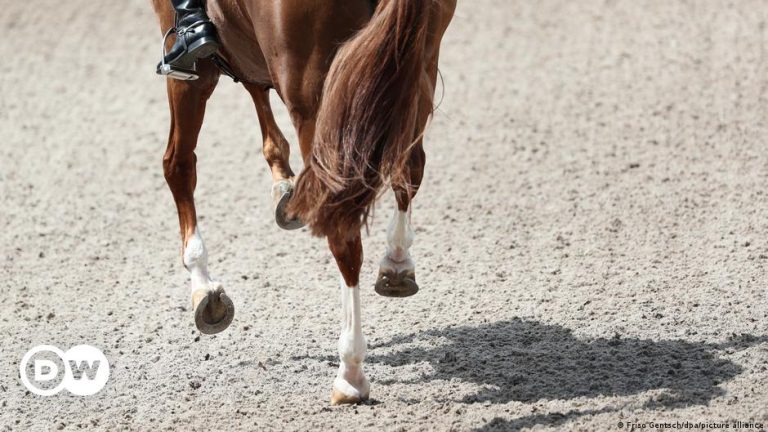The letter sent to the FEI, the international governing body for equestrian sports, left no room for interpretation: “Our sport is in grave danger. The current scandals and bad reputation threaten its existence and could mean the end of dressage and para-dressage.” Olympic disciplines.” The letter was sent by top athletes, coaches and officials from the dressage world, including seven-time Olympic champion Isabelle Werth from Germany. She is president of the International Dressage Riders Club (IDRC).
The correspondence was addressed to FEI President Ingmar de Vos and FEI Secretary General Sabrina Ibáñez, in response to the latest cases of animal cruelty in dressage. Another letter, from Northern European equestrian organizations from Sweden, Denmark, Finland and Norway, followed at the start of the week, and the FEI called for action at an international level. Despite all efforts to date, “there is still much more to be done to ensure the well-being of horses at all times,” the letter said.
Danish television channel TV2 aired a documentary in the fall that showed disturbing footage taken at the riding center of Danish Nations Cup rider Andreas Helgestrand. It showed horses bleeding from their mouths and wings during training. This has been reported to have occurred as a direct result of riders using the snaffle, or metal mouthpiece on a horse's bridle, and spurs with extreme force.
Even more disturbing are old videos of Colombian-born dressage rider Cesar Parra's training sessions that were published in January. Parra, who competes for the US national team, can be seen whipping the horses repeatedly at short intervals during their training. Sometimes horses are kicked and subjected to what is called rollcor, which has been banned by the FEI. It involves the rider pulling the horse's mouth down and away with the reins, so that the animal almost bites its chest. The horse's neck is strongly elongated and bent in the process. A couple of German horse breeders also attended the event.
“Disgusting and terrible”
The videos sparked angry reactions within Germany. National dressage coach Monica Theodorescu was quoted in a statement issued by the German Equestrian Federation (FN) as condemning “in the strongest possible terms such treatment of the horse as a partner. It is clear that we distance ourselves from this type of training methods.”
Hubertus Schmidt, the 2016 Olympic team champion with Germany in Rio de Janeiro, described the practices as “rape,” and equestrian Ingrid Klimke in particular described Barra’s case as “disgusting and terrible” on German television.
Both cases have already had consequences for the riders responsible. The Danish Federation has banned Helgstrand until 2025 and revoked the status of Helgstrand Dressage's training company. Parra was suspended by the FEI.
German dressage rider Matthias Rath has also come under scrutiny recently. Rath, who once competed for Germany in the European Championships and Nations Cup, is also reported to have subjected his horse Totilas to Rollkor during training for a tournament in northern Germany in January 2020. The horse died in December that year. Rath denied the reports, telling equestrian magazine Reiterrue that “incorrect head and neck position is neither my intention nor part of my training.”
Pentagram as a warning
Show jumping in the modern pentathlon should serve as a cautionary example to athletes, coaches and officials. Competitions in this sub-discipline at the 2021 Olympic Games in Tokyo turned into a farce and set an example of what equestrian sport should not look like. The saddest event at the time was the performance of German gold medal contender Annika Schlew and her national coach Kim Reisner. Despite the use of force and coercion, they were barely able to convince the frightened and exhausted horse to complete the trail.
The accident led to a worldwide debate, resulting in the modern pentathlon being unable to be ridden in the future. After the 2024 Olympics in Paris, show jumping will be replaced by a “Ninja Warrior”-style obstacle course for horses. The popular TV format sees contestants balance, climb and swing over numerous obstacles.
No decision has been made on whether instances of severe animal cruelty in dressage will lead the sport to a fate similar to that of the modern pentathlon. However, the debate over animal welfare in equestrian sport has been ongoing for some time, with animal rights activists and equestrian athletes often taking irreconcilable positions.
Wirth said on her Instagram channel that she hopes “in the future we can have an honest and fair discussion that clearly distinguishes between bad riding and animal cruelty.” She added that riding mistakes “may and should be discussed fairly.” “But please be realistic, objective and fair.”
CHIO Aachen project as an opportunity?
A pilot study was presented and launched at last year's CHIO show in Aachen, the world's largest equestrian event. The animal's safety was tested objectively, initially on six horses, including one of Wirth's dressage horses. The study included long-term camera monitoring of the horses' behavior during the tournament, including their sleeping rhythm in the stalls and measuring the stress hormone cortisol in the horse's feces.
The analysis is ongoing, and the results have not yet been presented. Anxious riders hope that all the horses tested did not feel stressed, but rather relaxed and at ease during the show in Aachen.
However, one fact should not be ignored: the event held in Aachen is known as the gold standard among horse shows. What applies here does not necessarily represent equestrian sport as a whole and cannot be generalized.
This article was originally written in German.

